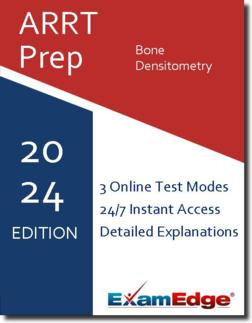ARRT Bone Densitometry (BONE) Practice Tests & Test Prep by Exam Edge - Exam Info
** Sample images, content may not apply to your exam **
The more you know about the ARRT Bone Densitometry exam the better prepared you will be! Our practice tests are designed to help you master both the subject matter and the art of test-taking to be sure you are fully prepared for your exam.
Here are a few things to think about:
- What is the ARRT Bone Densitometry certification exam?
- Who is Responsible for the ARRT exam?
- Am I eligibility for the ARRT Bone Densitometry Exam?
- What is the best way to ensure your succes on the first try?
- The benefits of using Exam Edge to pass your ARRT Bone Densitometry exam.
Not ready to purchase our complete practice tests yet? Start with a ARRT Bone Densitometry FREE Practice Test first!
ARRT Bone Densitometry - Additional Information
Our trusted healthcare providers hold lives in their hands. Without formal training, education and first-hand experience, these professionals could not perform to the high standards they're expected to meet. Certification exams help qualify healthcare professionals for their careers. One such certification exam, the ARRT Bone Densitometry (BONE) test, serves to certify doctors, technologists, and other healthcare workers in the diagnosis and treatment of osteoporosis. ARRT Bone Densitometry (BONE) practice tests are a great resource to help examinees prepare.
ARRT Bone Densitometry - Additional Info Sample Questions
|
|
What is the ARRT Bone Densitometry (BONE) Exam?
Developed by the American Registry of Radiologic Technologists, the ARRT Bone Densitometry (BONE) exam was developed to qualify healthcare professionals for work in Bone Densitometry. Healthy bones are important at every age, but as patients grow older, their bones may become more fragile. A qualified Bone Densitometry technologist can help diagnose osteoporosis and treat patients effectively. Of course, certification plays a large role in that process. Anyone hoping to earn their certification should consider first taking a few ARRT Bone Densitometry (BONE) practice exams to guide their test prep efforts.
Who Should Take the ARRT Bone Densitometry (BONE) Exam?
The ARRT Bone Densitometry (BONE) exam represents the final hurdle in a long marathon of education, training and first-hand experience. Before you can register for the test, you must first complete the necessary requirements. There are strict education requirements listed by discipline on the official ARRT website. Clinical experience is also required before you can sign up for this test. Before you begin your ARRT Bone Densitometry (BONE) exam prep, make sure you qualify to register for the test.
How Much Does the ARRT Bone Densitometry (BONE) Exam Cost?
Certification exams are an excellent investment in your career. They demonstrate your abilities, knowledge and mastery of key concepts. Certification isn't just a good idea – it's mandatory for healthcare workers hoping to find jobs in certified clinical settings. To ensure your candidacy is taken seriously by employers, you'll want to sign up for the ARRT Bone Densitometry (BONE) test as soon as you're eligible. Certification costs start at $200, which includes your testing price and the license you'll receive upon passing the exam. Make sure you're investing your money wisely. Take ARRT Bone Densitometry (BONE) test prep seriously in the days and weeks leading up to the exam.
How Many Questions are on the ARRT Bone Densitometry (BONE) Exam?
The ARRT Bone Densitometry (BONE) test is made up of 75 questions. Expect 16 questions on patient care, 21 questions on image production and 38 questions on procedures. ARRT Bone Densitometry (BONE) exam practice tests can help you master each category of questions.
Prepare Now for Your ARRT Bone Densitometry (BONE) Exam
You've worked hard to earn a degree, thrive in a clinical setting, and network with fellow healthcare professionals. Demonstrate your mastery of bone densitometry principles, procedures and best practices by registering for this challenging exam. Before you head to the testing center, though, it's best to spend some time with ARRT Bone Densitometry (BONE) practice tests first. There's no better way to prepare for your exam!






